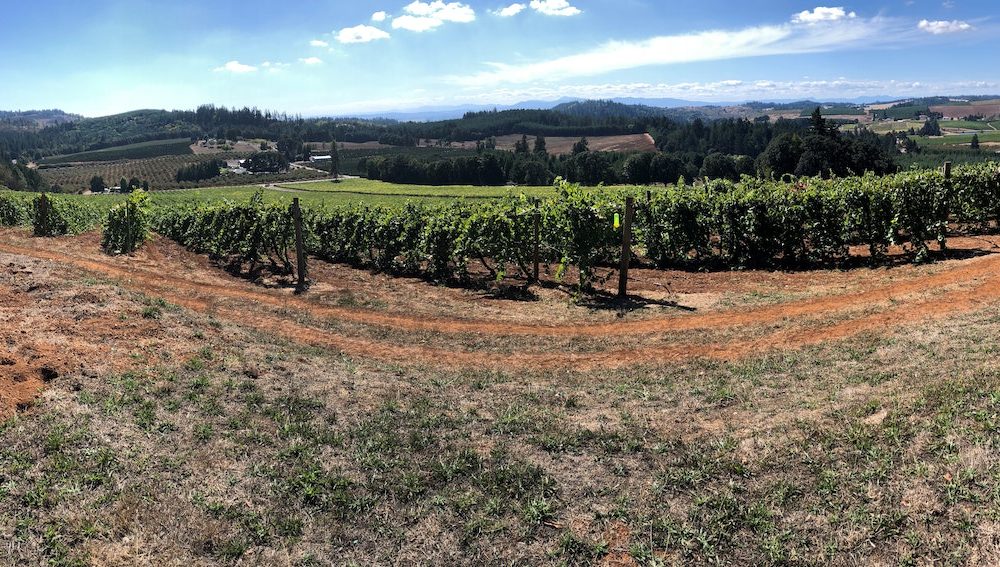 Grapevines hang at Willamette Valley Vineyard in September. The vineyard has been one of the most visible to confront a Napa Valley winery over its labeling practices. (Troy Brynelson/Salem Reporter)
Grapevines hang at Willamette Valley Vineyard in September. The vineyard has been one of the most visible to confront a Napa Valley winery over its labeling practices. (Troy Brynelson/Salem Reporter)
Willamette Valley winemakers are praising a decision by federal regulators that will change an embattled California winery’s labels.
The federal Alcohol and Tobacco Tax and Trade Bureau, also known as the TTB, has required Napa Valley winery Copper Cane to change or surrender nine of its certified wine labels, according to the agency’s online database.
The agency has been examining how Copper Cane labels its brands of pinot noir. Oregon winemakers contended the label designs hijacked reputations of the Willamette, Umpqua and Rogue valleys, and took poetic license with the wines’ origins.
Copper Cane defended its labeling, saying the grapes hailed from those regions and the winery hoped to flaunt that. Their labels were initially approved by federal regulators in February.
Jim Blumling, vice president of operations at Copper Cane, told Salem Reporter Wednesday that new pinot noir labels won’t mention those valleys but will still refer to Oregon.
“We just received new labels for Elouan and Willametter Journal (brands of pinot noir) yesterday,” he said. “We’ve been advised we can’t use any of the (names of the winemaking regions) or any points of geographic designation in describing the fruit source, even if it’s accurate or authentic.”
“So we’ve adjusted our romance copy so we can talk about Oregon’s influences and not talk about the geographies that are in question,” he added.
Winemaking regions like the Willamette, Rogue and Umpqua Valley are known as “American viticultural areas,” federally protected by the TTB, and there are strict criteria about how wines can attribute their flavors to those areas.
Jim Bernau, co-founder of Willamette Valley Vineyards, told Salem Reporter that the moves were good signs for him and his peers.
“It’s really reassuring that the TTB has come to the defense of the AVAs. That’s a big, big deal,” he said. “That’s fundamentally what the issue is here: trying to misrepresent and capitalize on Oregon AVAs.”
Blumling said the California firm voluntarily surrendered several labels, some of which had not been used in years, he said. The new labels will be placed on the remainder of wines vinted in 2017 and into the future, he said.
Those new labels won’t balm all the concerns for those confronting Copper Cane.
Bernau and state Rep. David Gomberg, D-Otis, both noted that the new labels don’t take wines off the shelves. They claim 900,000 bottles will remain in stores with old labels, which concerns them.
“It could take three years to clear this out of the market pipeline and I think a fair amount of damage could be done by those bottles,” said Gomberg, who serves on the House Economic Development and Trade Committee.
Bernau and Gomberg said they are concerned the Napa Valley-made wines don’t use enough Oregon grapes to be considered Oregon pinot noir and are pushing on that front, as well.
A few regulatory pieces are in motion. The Oregon Liquor Control Commission, which has its own wine regulations distinct from the TTB, is still investigating Copper Cane. And Gomberg has also complained to the state Department of Justice that the wines don’t meet OLCC standards to sell in Oregon.
And, in October, Oregon’s federal delegates called on federal regulators to audit Copper Cane’s wines, which could be a far more involved investigation.
Blumling said Copper Cane will have a clearer idea of whether it can continue selling its stock of the dispute wines after a meeting next with the OLCC.
“I can’t speak to you with clarity about our selling in Oregon,” he said. “We’re still working on that.”
Have a tip? Contact reporter Troy Brynelson at 503-575-9930, [email protected] or @TroyWB.









